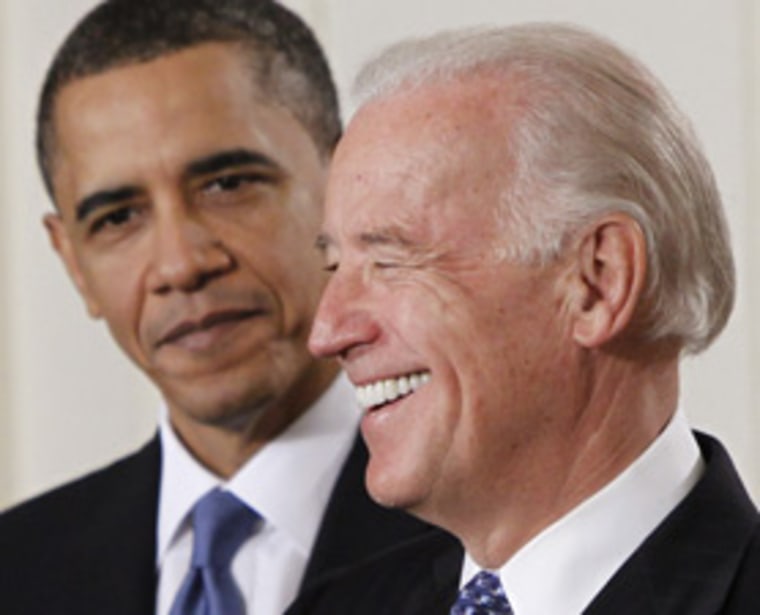This week's historic health-care vote evoked strong reactions across the United States, including from the vice president of the United States. "This is a big f-ing deal," Joe Biden whispered to Barack Obama, as the men shook hands in front of a cheering crowd and an open mic.
Biden's remark was intended for Obama's ears only, but that nearby microphone broadcast his profanity to the world. Now, as blogs buzz about whether the comment was inappropriate or uncivil, language experts say that the slip is simply another example of how normal it is to swear in everyday speech.
In fact, while the specific words we consider vulgar have changed over time, curse words have been around for hundreds of years, maybe more. Words like the f-bomb are powerful because they do a particularly good job of expressing strong feelings.
"'Big f-ing deal' is a perfectly reasonable thing to say when you're talking to a friend about something that was a big f-ing deal," said Geoff Nunberg, a linguist at the University of California, Berkeley's School of Information. "It's emphatic and has an intensity of emotion. To say 'This was certainly a big deal,' or, 'This was an awfully big deal,' does not convey that emotion."
It's their taboo status that gives swear words power: the more restrictions you put on something, the more alluring it is to say. In saying something that we're not really supposed to say, we're pointing out that this topic is so important to us that we're willing to cross boundaries to make that clear.
There may be another reason why we swear so much. Studies by psychologist Timothy Jay, of the Massachusetts College of Liberal Arts in North Adams, have found that swearing can provide both emotional release and relief from pain.
"People have a sense of catharsis, they feel better after using this kind of language," Jay told Discovery News. "Most people look at swearing as a bad thing that you shouldn't do, without asking what the positive aspects of it are."
To condemn politicians for swearing in private contexts, as Biden did, is nothing but hypocritical, Jay said. In many social settings, like among teenagers or rugby players, he added, it would be strange not to use foul language.
Throughout history, swear words have reflected the taboos of time and place. A century or two ago, religious words dominated the lewd lexicon: Hell and damn were unspeakable in proper company.
Biden's profanity of choice has 15th-century Germanic origins, said lexicographer Jesse Sheidlower, editor at large of the Oxford English Dictionary and author of a book called "The F-Word." Originally, he said, the word's root meant, "to move back and forth."
Despite popular rumors, it is not an acronym for "For Unlawful Carnal Knowledge" or anything else.
Over the centuries, the word has appeared repeatedly in obscene contexts in letters and poems, sometimes written in code. At some point in the 20th century, Sheidlower said, it began to reach beyond its sexual connotations. As the word became more figurative, it took on an unmatched level of versatility.
Today, variations of the word can function as a noun, a verb, an adjective, an adverb and an expletive. It can be used to describe everything from cheating spouses to political documents to neighbors who mow their lawn at dawn. Not only can the word be anything you want it to be, it's equal-opportunity: These days, women use it just as much as men do. Even other cultures incorporate it into their languages as a kind of universal powerful swear word.
"I think this is one of the most important words in the language," Sheidlower said. "People use it all the time."
